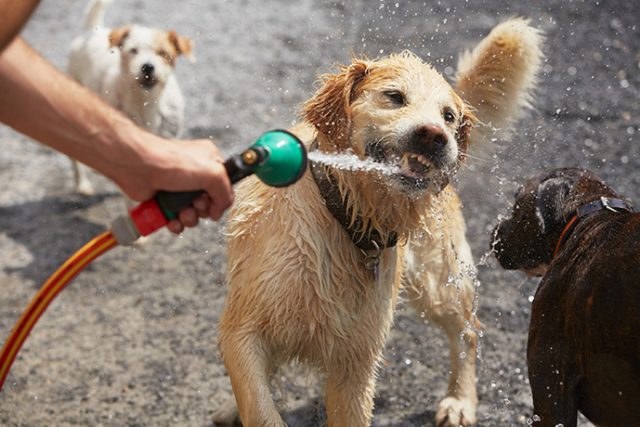Multiple dogs have died of avoidable heat stress already this year, with many more pulled from hot cars in great distress.
With what some meteorologists are calling a “hell on earth” heatwave set to hit Penrith this weekend, RSPCA NSW are pleading with pet owners to not leave dogs in parked cars and to take extra precautions.
One of the avoidable deaths was in a car parked in an underground carpark with the windows wound down – a common misconception that leaving a dog in a car parked in the shade or with the windows down is safe. Police are also investigating four dogs that died this week in Gulgong, NSW that were left in the back of a ute.
“It’s apparent some people are just not getting the message that a parked car is no place for a dog. It can be lethal, as we see all too often,” comments RSPCA NSW Chief Inspector David OShannessy.
“It only takes six minutes for an animal to die from heat stroke. Cars parked in the sun can reach temperatures in excess of 80 degrees Celsius, and can remain dangerously hot even if the windows are open. Evidently, even cars parked in the shade – even in an underground carpark – can reach lethal temperatures. A dog cannot sweat in these conditions and panting increases the heat in the car.”
The heatwave has been predicted to be the strongest we have seen for 2016-17, and will see temperatures reach the mid-40s mark.
RSPCA NSW is urging pet owners to plan ahead – don’t take your dog with you in the car unless absolutely vital. Make appropriate arrangements like leaving them at home in the air conditioning or a fan, and take extra precautions to help ensure animals have constant access to water and shade, as potentially lethal heat stress can develop extremely quickly in hot weather.
Walking your dog during the heat of the day can result in excruciating blistered feet pads, so wait until early morning or the evening.
“Cars left stationary in the sun become ovens. Ute trays also become extremely hot, so dogs can suffer a similar fate. If a dog dies from being left in a car, the owner can receive a $22,000 fine and a two-year prison sentence,” comments OShannessy.
“Parked cars are death traps. Just don’t do it.”
If animals need to be left in the backyard, they must also be able to access shelter and water. If a dog is tethered they can become tangled and be unable to reach their water or shelter.
RSPCA NSW recommends that there are at least two to three containers of water in case one gets knocked over. A dog can survive for a few days without food, but in this weather, if it has no shade or water it will die.
RSPCA NSW have offered the following tips to help keep pets cool this summer:
1. extra bowls of water in case one is accidentally tipped over
2. takeaway containers filled with beef/chicken stock, frozen overnight and given to outdoor animals
3. ice cubes in water bowls. Be careful, as some animals will avoid drinking the water if they are concerned about the floating ice cubes. A good alternative is to freeze half a water bowl the night before and top the remainder up with cool water when putting out
4. paddling pools (clams are especially popular) filled with water and under your supervision
5. NEVER leave dogs in cars, even with the windows down, and even in the shade — dogs can’t sweat; heat stress and death can occur in as little as six minutes
6. always walk your dog in the early morning or late evening to avoid the heat of the day
7. ensure pets have easy access to shade and water throughout the day, including extra shade areas in your backyard using shade cloths and shade umbrellas
8. spray pet birds with a mist pump spray bottle (only if they like it!) or install a bird bath for supervised use
9. cool a ceramic tile or oven pan in the fridge or freezer and put it out for small dogs and cats to lie on
10. for pocket pets, little bags of ice wrapped in small, wet towels provide heat relief
11. allow your outdoor animals to come inside the house and share the air conditioning or electric fan.
Heat stress looks like:
• excessive panting for dogs
• any kind of panting or increase in breathing for cats, birds, rabbits, ferrets or Guinea Pigs
• dark red gums or tongue
• confusion
• vomiting
• collapse
If you think your pet is suffering from heat stroke, please urgently call an RSPCA veterinary hospital or your local veterinarian.

Weekender Newsroom
This post has been published by the team in our newsroom.

